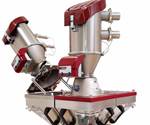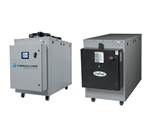Process Cooling: Variable-Speed Chillers Boast Dramatic Energy Savings
Variable-speed, air-cooled chillers from Delta T Systems complement water-cooled versions announced earlier.
After introducing a new line of variable-speed, air-cooled chillers last July (see May ’17 Close-Up), Delta T Systems, Richfield, Wis., is coming out in May with variable-speed, water-cooled chillers of 2 to 30 tons . A variable-speed compressor, together with an electronic expansion valve, a modulating control valve, and sophisticated controls are said to provide at least 30% to 50% energy-cost reductions. A 10-ton chiller operating one full shift per day reportedly could pay for itself in energy savings within three years.
Integration of variable-speed controls is proven technology but relatively new to process cooling. The number of brands offering this feature is gradually multiplying (see, for example, Keeping Up in June ’17 and Dec. ’17, and here). The new water-cooled chillers are said to offer temperature control within ±0.5° F, a stainless-steel and copper brazed-plate evaporator for reduced maintenance, nonferrous chilled-water piping, “the smallest footprint in the industry,” and advanced controls that are “ready for Industry 4.0.”
Learn more about these variable-speed chillers in a technical presentation at Plastics Technology’s , Feb. 27-Mar. 1 in Long Beach, Calif. The new chillers will also be on display at NPE 2018, May 7-11 in Orlando, Fla.
Related Content
-
Chiller Lines Updated to EPA-Approved Refrigerants
Thermal Care’s chillers now utilize EPA-approved low Global Warming Potential (GWP) RŌĆÉ454B and RŌĆÉ513A refrigerants.
-
Service Enables One-Day Auxiliary Commissioning
One-day, on-site equipment setup and training assistance program for all types of Conair auxiliaries.
-
Is Your Water System Setup Helping or Hurting Your Molding Plant Productivity?
The plant water system is a critical component of an injection molding facility. A poorly designed or maintained water-cooling system can have a serious impact on production efficiency and cause many maintenance issues. Here’s what you need to know — and ask — to prevent those problems.


